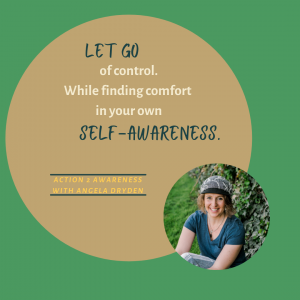
5 Tips for a Great Presentation
Tony Robins shares that we as humans have human needs and they are, certainty, variety, connection, contribution, growth, and significance. In daily life, you can


Can you remember a time when you have experienced self-discovery either as an adult or a child, and how accomplished you felt that you figured it out? When we try to control others’ lives we are taking away their self-discovery process. This will not only diminish their experience but yours in turn.
Gaining Self-Awareness of what we can control helps us keep and have loving relationships with people in our lives. When we begin to think such thoughts as, “I have to do this, or it won’t be done correctly” or “this is the right way to do it,” we might not be giving others the space to develop skills, grow in confidence or simply show we believe they are capable. Asking yourself, “does it have to be done” and “is there another way to do this?” or “can I give it to someone else?” may help you learn—over time—to let things go.
Cultivating a life of self-awareness is a wonderful Leading lady behavior that you can exchange for the co-dependent behaviors of wanting to control everything. Many are unaware when they are portraying control behaviors as they proclaim that it is not themselves but others who are trying to control things.
Since it is a behavior we easily identify in others and don’t see it in ourselves it can be a tricky one to detect. Having a sense of control in our lives is something I think we humans gravitate toward. The truth is that everything outside of you—when it comes to everyday life— is out of your control. A question worth asking yourself when you are feeling out of control might be, “what is my part in this, and how do I want to respond to it.”
Being human, we not only desire a sense of control but also answers. Telling someone how to do simple tasks or wanting them to do it your way and becoming angry because they don’t, may indicate you are trying to control the situation.
Behaving passive-aggressively is another kind of controlling behavior. Asking a loved one the question,” Why don’t you love me,” or saying, “you don’t love me anymore,” or even, “you’re not mad at me are you?” are leading questions with hidden undertones. Indirect questions like these are a way for co-dependents to manipulate the relationship. It’s not necessarily on purpose but more to do with the fact we are insecure, and so we look for validation outside of ourselves.

Controlling behavior can look like nagging, thinking you have the answers, and passive-aggressive speaking. Look for these in your day to day living and become aware of how you respond in situations, how you talk to yourself, and the effort you give. Holding space for yourself will help you as you grow in letting go of control and embracing your own Self-Awareness.
Creating Self-Awareness and allowing yourself to observe your own behavior can be disheartening at first, but as you hold compassion for yourself it will slowly become liberating. Remember, you are your own worst critic. If any of the examples I explored in this blog resonates with you, schedule your discovery coach call. It’s a great way to see what coaching with me is all about. Here is the link to get started and discover what is possible. https://angeladryden.com/contact-angela/
Get the Zoom link sent to your inbox and join the live call of the week.

Tony Robins shares that we as humans have human needs and they are, certainty, variety, connection, contribution, growth, and significance. In daily life, you can

Positive Thinking I love a great positive thought as much as the next person, daily affirmations, and aspiring quotes used to be a part of

I was at the store and saw many men buying chocolates, flowers, and stuffed animals. As a lady that will be married 24 years on

As a culture, we have gotten a little confused about the difference between worth and value in my opinion. A few things have helped me